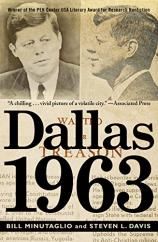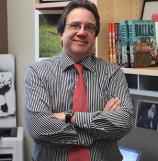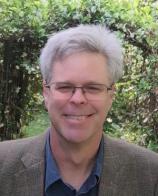Dallas 1963
Review
Dallas 1963
It was a game changer, a world changer. In November 1963, a man was killed. Any American adult alive on that day will remember where he or she was when the shocking news blasted through the thin media airwaves of those less complicated times: “A tragic thing has happened…in the city of Dallas.” President John F. Kennedy had been assassinated.
DALLAS 1963 by Bill Minutaglio (CITY ON FIRE, FIRST SON) and Steven L. Davis (TEXAS LITERARY OUTLAWS, J. FRANK DOBIE) examines the personality of the city of Dallas and the many cross-currents that defined it, looking at some famous or notorious citizens and their outspoken, often violent agendas. Kennedy campaigned there in 1960 and three years later returned to “the stronghold of Republicanism in Texas,” the home base of Rev. W. A. Criswell, a virulent racist who considered civil rights activists to be “a bunch of infidels”; where far-right billionaire H. L. Hunt openly espoused a utopian view that would deny voting rights to all but the wealthiest. There was Ted Dealey of The Dallas Morning News, who saw the nation slipping toward socialism, led by Kennedy and his ilk. The authors depict Dallas as a city “willed into existence by creative, nimble entrepreneurs,” a hotbed of the KKK, a city that kept its troubles bottled up, under control, until Kennedy came to visit. Then all hell broke loose.
"DALLAS 1963 is a journalistic portrait of the leaders, the times and the morals that will shock many, especially the current generation of Americans who have grown up in a gentler, more tolerant social climate."
The book begins in 1959, when “Nikita Khrushchev can’t get into Disneyland,” and the opposition to racial integration was seen as a last stand against an evil epidemic that included social ills from “Social Security to fluoridated water to membership in the United Nations.” Many in Dallas, like General Edwin Walker, believed that civil rights activists were the new enemy within. Month by month and year by year, we feel the tensions building in the city, while way behind the scenes, totally unsuspected, we see Lee Harvey Oswald, a twisted little man trying to provoke a new revolution.
The hate speech mounted preceding the Kennedy visit. This included a full-page ad in the morning paper denouncing the President and fatefully edged in black, the radio broadcasts of H. L. Hunt’s warning that if socialism were to prevail, “You would not be able to celebrate any holiday of freedom,” and even “Wanted” posters describing Kennedy as a traitor who was selling the country out to Communists and Anti-Christians. Even so, Jack and Jackie, riding through the city in a well-guarded motorcade, were pleased and surprised to see how apparently welcoming the crowds were that lined their route.
Created neither to praise or bury Dallas, nor to address the many conspiracy theories that have mushroomed over the years since Kennedy’s violent demise, DALLAS 1963 is a journalistic portrait of the leaders, the times and the morals that will shock many, especially the current generation of Americans who have grown up in a gentler, more tolerant social climate. It has been 50 years since those fateful events in Dallas, and much has changed. Going back in memory through objective eyes may help us see those changes more clearly and be grateful.
Reviewed by Barbara Bamberger Scott on October 11, 2013
Dallas 1963
- Publication Date: October 21, 2014
- Genres: History, Nonfiction
- Paperback: 384 pages
- Publisher: Twelve
- ISBN-10: 1455522104
- ISBN-13: 9781455522101






